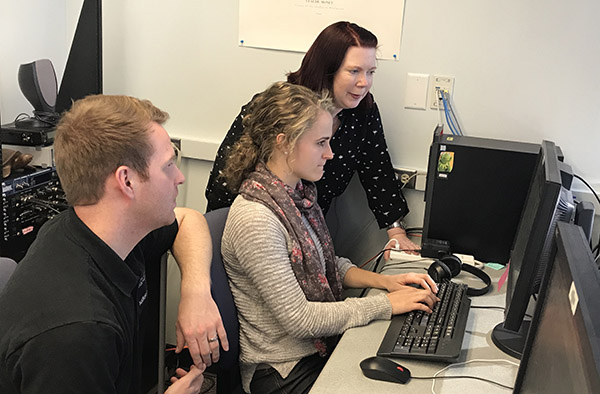1998 Student Research Grant in Audiology
Clearing the Way

Sarah Hargus Ferguson, well before she became an associate professor at the University of Utah, wanted to improve communication for older adults with hearing loss. That's what stimulated her interest in audiology in the first place. Then she became interested in involving everyday communication partners in her work. And that's how her research in the area of clear speech began.
"I think it's really important for us to offer strategies other than hearing aids to people with hearing loss," says Ferguson, especially since many people balk at wearing them. One important strategy is speaking slowly and clearly. When communication partners are asked to do so, however, Ferguson has found that not all of them know how. She is taking advantage of this variability among speakers to develop a profile of what exactly makes clear speech clear.
"What is an effective talker? Who is an effective clear speaker? What does this person do? Once I can answer these questions," Ferguson believes, "then I can teach the people who are not naturally effective clear speakers to become clear. This is my long-term goal. I can foresee working with couples and assessing how they communicate. Are they good at it? Would they benefit from training?"
Ferguson's grant from the ASHFoundation turned out to be the funding groundwork for her continuing research. That initial grant led to internal funding while she was an assistant professor at the University of Kansas. "Between the ASHFoundation support and the internal funding," says Ferguson, "I could gather enough preliminary data to allow me to apply for an NIH R03 grant, which was ultimately successful. It was my first government funding for my clear speech research." Further, her investigations have led to several collaborations, including a partnership with Alison Behrman at CUNY-Lehman Collage in which Ferguson is overseeing a perceptual study of materials recorded by Behrman. This project will examine clear speech production in non-native English speakers.
It was that initial ASHFoundation grant that opened doors, and not just the doors to federal funding and research collaborations, but to acceptance within the community of communication science and disorders and to the freedom to develop ideas and to dream of solutions.
"The ASHFoundation awards give scientists a chance to try something that may be risky or new to the researcher or new to the field and to develop preliminary data that will be important for future funding," says Ferguson. "We can't wait for the government to fund these new ideas. We ourselves have to believe in what we do and, especially in our evidence-based, scientifically based field, we have to believe in the necessity of forming a scientific foundation for our work and we’ve got to fund that. The ASHFoundation does it. It's the place for new investigators or seasoned investigators with new ideas."
View More Recipient Spotlights